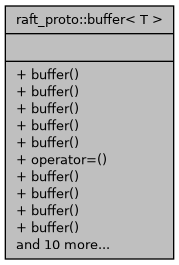A container which may or may not own its own data on host or device. More...
#include <buffer.hpp>
Collaboration diagram for raft_proto::buffer< T >:

Public Types | |
| using | index_type = std::size_t |
| using | value_type = T |
| using | data_store = std::variant< non_owning_buffer< device_type::cpu, T >, non_owning_buffer< device_type::gpu, T >, owning_buffer< device_type::cpu, T >, owning_buffer< device_type::gpu, T > > |
Public Member Functions | |
| buffer () | |
| buffer (index_type size, device_type mem_type=device_type::cpu, int device=0, cuda_stream stream=0) | |
| buffer (T *input_data, index_type size, device_type mem_type=device_type::cpu, int device=0) | |
| buffer (buffer< T > const &other, device_type mem_type, int device=0, cuda_stream stream=cuda_stream{}) | |
| Construct one buffer from another in the given memory location (either on host or on device) A buffer constructed in this way is owning and will copy the data from the original location. More... | |
| buffer (buffer< T > const &other, cuda_stream stream=cuda_stream{}) | |
| Create owning copy of existing buffer with given stream The memory type of this new buffer will be the same as the original. More... | |
| buffer< T > & | operator= (buffer< T > const &other) |
| buffer (buffer< T > &&other, device_type mem_type, int device, cuda_stream stream) | |
| Move from existing buffer unless a copy is necessary based on memory location. More... | |
| buffer (buffer< T > &&other, device_type mem_type, int device) | |
| buffer (buffer< T > &&other, device_type mem_type) | |
| buffer (buffer< T > &&other) noexcept | |
| buffer< T > & | operator= (buffer< T > &&other) noexcept |
| template<typename iter_t , typename = decltype(*std::declval<iter_t&>(), void(), ++std::declval<iter_t&>(), void())> | |
| buffer (iter_t const &begin, iter_t const &end) | |
| template<typename iter_t , typename = decltype(*std::declval<iter_t&>(), void(), ++std::declval<iter_t&>(), void())> | |
| buffer (iter_t const &begin, iter_t const &end, device_type mem_type) | |
| template<typename iter_t , typename = decltype(*std::declval<iter_t&>(), void(), ++std::declval<iter_t&>(), void())> | |
| buffer (iter_t const &begin, iter_t const &end, device_type mem_type, int device, cuda_stream stream=cuda_stream{}) | |
| auto | size () const noexcept |
| HOST DEVICE auto * | data () const noexcept |
| auto | memory_type () const noexcept |
| auto | device () const noexcept |
| auto | device_index () const noexcept |
| ~buffer ()=default | |
Friends | |
| void | swap (buffer< T > &first, buffer< T > &second) |
| Create owning copy of existing buffer The memory type of this new buffer will be the same as the original. More... | |
Detailed Description
template<typename T>
struct raft_proto::buffer< T >
A container which may or may not own its own data on host or device.
Member Typedef Documentation
◆ data_store
template<typename T >
| using raft_proto::buffer< T >::data_store = std::variant<non_owning_buffer<device_type::cpu, T>, non_owning_buffer<device_type::gpu, T>, owning_buffer<device_type::cpu, T>, owning_buffer<device_type::gpu, T> > |
◆ index_type
template<typename T >
| using raft_proto::buffer< T >::index_type = std::size_t |
◆ value_type
template<typename T >
| using raft_proto::buffer< T >::value_type = T |
Constructor & Destructor Documentation
◆ buffer() [1/12]
template<typename T >
|
inline |
◆ buffer() [2/12]
template<typename T >
|
inline |
Construct non-initialized owning buffer
◆ buffer() [3/12]
template<typename T >
|
inline |
Construct non-owning buffer
◆ buffer() [4/12]
template<typename T >
|
inline |
Construct one buffer from another in the given memory location (either on host or on device) A buffer constructed in this way is owning and will copy the data from the original location.
◆ buffer() [5/12]
template<typename T >
|
inline |
Create owning copy of existing buffer with given stream The memory type of this new buffer will be the same as the original.
◆ buffer() [6/12]
template<typename T >
|
inline |
Move from existing buffer unless a copy is necessary based on memory location.
◆ buffer() [7/12]
template<typename T >
|
inline |
◆ buffer() [8/12]
template<typename T >
|
inline |
◆ buffer() [9/12]
template<typename T >
|
inlinenoexcept |
◆ buffer() [10/12]
template<typename T >
template<typename iter_t , typename = decltype(*std::declval<iter_t&>(), void(), ++std::declval<iter_t&>(), void())>
|
inline |
◆ buffer() [11/12]
template<typename T >
template<typename iter_t , typename = decltype(*std::declval<iter_t&>(), void(), ++std::declval<iter_t&>(), void())>
|
inline |
◆ buffer() [12/12]
template<typename T >
template<typename iter_t , typename = decltype(*std::declval<iter_t&>(), void(), ++std::declval<iter_t&>(), void())>
|
inline |
◆ ~buffer()
template<typename T >
|
default |
Member Function Documentation
◆ data()
template<typename T >
|
inlinenoexcept |
◆ device()
template<typename T >
|
inlinenoexcept |
◆ device_index()
template<typename T >
|
inlinenoexcept |
◆ memory_type()
template<typename T >
|
inlinenoexcept |
◆ operator=() [1/2]
template<typename T >
|
inlinenoexcept |
◆ operator=() [2/2]
template<typename T >
|
inline |
◆ size()
template<typename T >
|
inlinenoexcept |
Friends And Related Function Documentation
◆ swap
Create owning copy of existing buffer The memory type of this new buffer will be the same as the original.
The documentation for this struct was generated from the following file:
- include/cuml/fil/detail/raft_proto/buffer.hpp